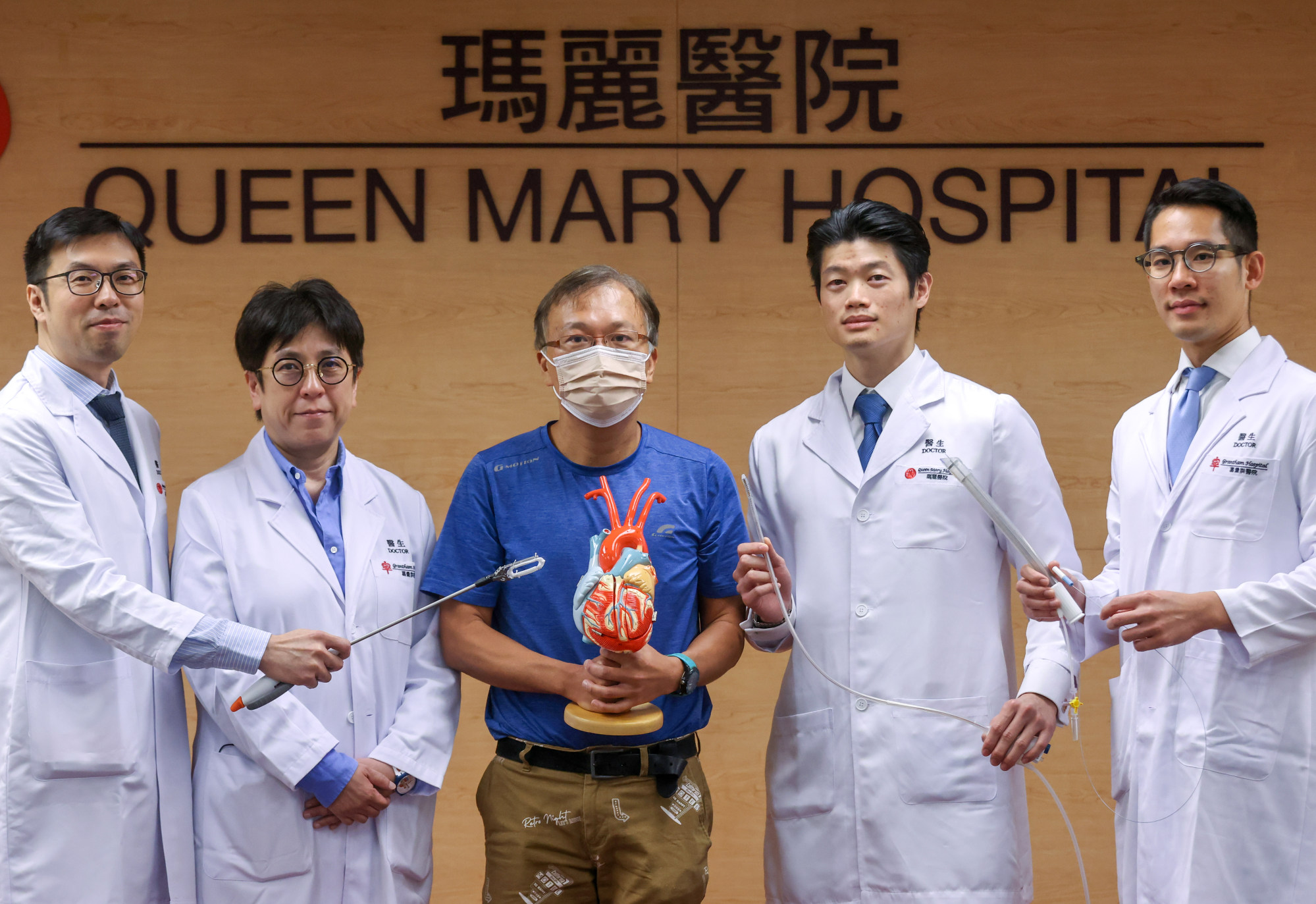
Hong Kong public hospitals offer new treatment for patients with chronic irregular heartbeat
- Eleven patients have undergone new two-part procedure that needs two surgeons working together
- Doctors say new treatment is ‘more effective, faster and safer’ and has fewer side effects too
Doctors in Hong Kong have begun using a new procedure to treat patients with chronic irregular heartbeat, claiming a first in Asia.
The two-part procedure has to be performed by two heart specialists. Since March this year, it has been used for 11 patients, most of whom have completed both parts of the treatment.
Experts said the treatment was “more effective, faster and safer” than the usual ways of treating such patients, especially those with severe and long-standing conditions, and had fewer side effects too.
First developed in the Netherlands, the procedure has been used in the United States and Europe.
It was introduced this year at public hospitals in the Central and Wan Chai and Southern districts, including Grantham Hospital and Queen Mary Hospital.

Patients at present have to pay to undergo the treatment.
The most common type of irregular heartbeat is atrial fibrillation, when abnormal electrical signals cause the heartbeat to go awry. It is estimated to affect about 46 million people worldwide, three-quarters of them aged 65 and above.
It can start as an occasional occurrence, but patients tend to see their conditions worsen with time into a persistent, chronic condition.
Experts expect that with Hong Kong’s rapidly ageing population, atrial fibrillation could affect close to 90,000 people – or 1.1 per cent of the population – by 2030.
Dr Ian Ling Wood-hay, cardiac medicine associate consultant at Grantham Hospital, said the condition could raise the risk of brain degeneration, stroke, heart failure and even death.
Most patients in Hong Kong control their condition with medication, including blood thinners, to lower the risk of stroke.
Some undergo a procedure known as ablation, which uses radio waves to blast certain heart tissues to stop the abnormal electrical signals. However, this is less effective for those with more serious conditions, with up to 45 per cent of patients relapsing after five years.
Queen Mary Hospital associate consultant of cardiothoracic surgery Dr Max Wong Kwun-hung said the new “convergence” procedure was split into two parts.
Two heart surgeons work together carrying out two types of ablation procedures on the outer and inner parts of the heart.
Wong said the procedure was not considered complicated, because it did not involve open chest surgery and patients did not have to be hooked up to a machine pumping oxygen into the blood.
He said an international study last year reported that 77 per cent of more than 700 patients who underwent the procedure did not see their symptoms return within a year.
Three in four of the 11 Hong Kong patients who had the treatment this year were men. The patients had an average age of 64 and most had lived with atrial fibrillation for around 6½ years.
Ten of them had no complications afterwards. One patient reported having irregular heartbeat once, but has maintained a normal rhythm ever since.
Patients typically spent about four days in hospital. Dr Wong said the most common side effect was some pain or numbness at the site of the procedure.
The first Hong Kong patient to undergo the procedure was pleased with the outcome after living with atrial fibrillation for more than 10 years.
Preferring to be identified only by his surname Kwan, he said it worked “like magic” and he could walk, eat, run and jump within just three days.
He underwent ablation treatment twice in 2014, but his irregular heartbeat returned at the beginning of this year.
“This condition has haunted me for most of my life, slowly, step by step,” he said.
Describing how life has changed since the treatment, he said: “There are times when it feels like my heart wants to beat crazily again, but it doesn’t.”
His doctors also told him they were considering taking him off blood thinners.
“I am relieved at the possibility of not being on that medication for the rest of my life,” he said.
For now, the procedure is available only at the city’s West Cluster of public hospitals with doctors collaborating to treat patients.
Deputy Chief of Service Dr Daniel Chan Tai-leung, from Queen Mary Hospital’s department of cardiothoracic surgery, said one constraint was that the procedure needed two heart surgeons to be involved.
“Of course, we do hope it can become available at all hospitals across the city in the future,” he added.
